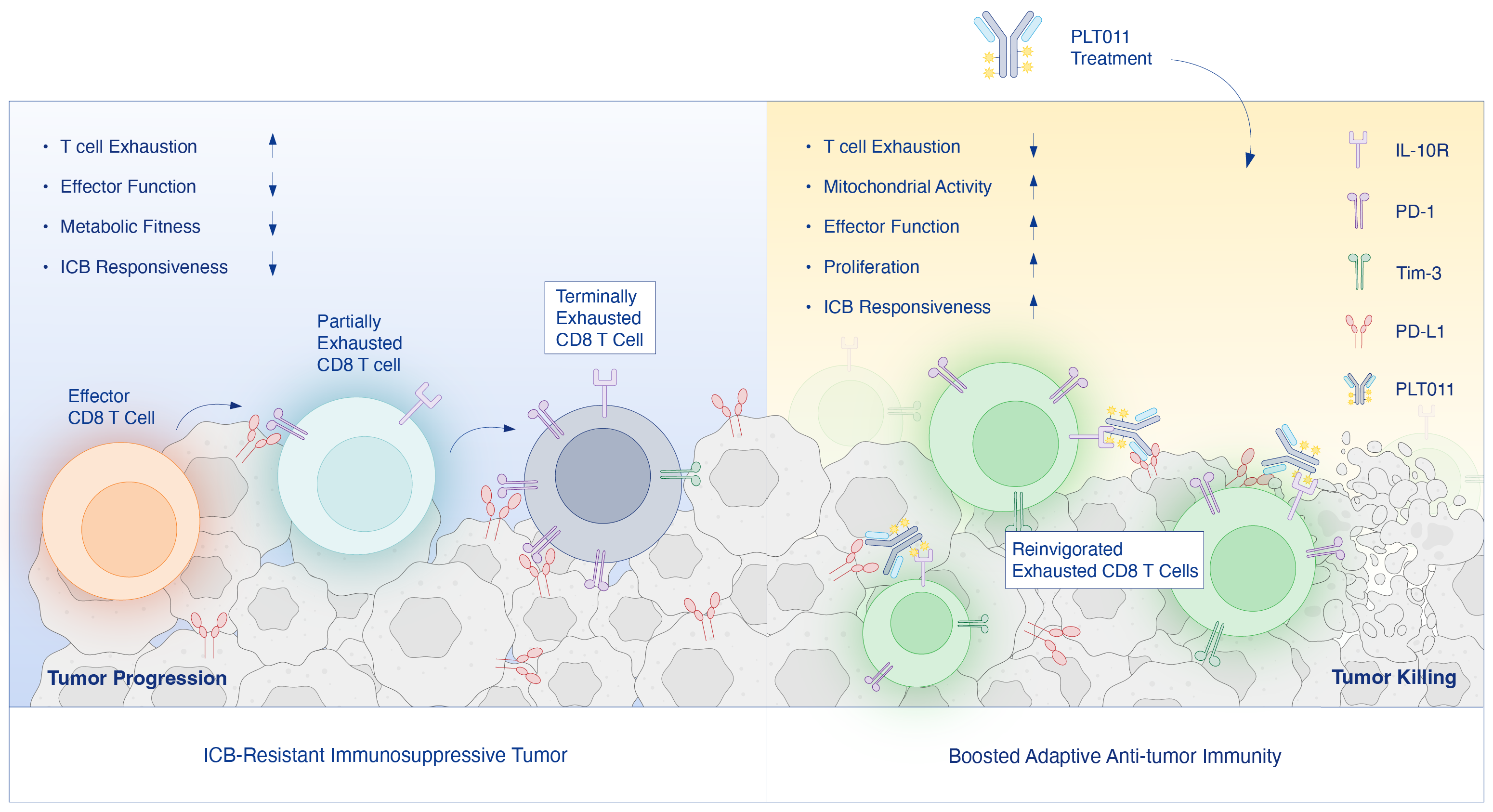PLT011:
Revitalizing Immune Responses with Dual Action
Modality
Discovery
IND-enabling Development
Phase I
Phase II
PLT011 PD-L1/IL-10 Bifunctional Protein
Immunotherapy
Pipelines
Indication
Discovery
IND-enabling
Development
First-in-Human
Study
Proof-of-Concept
Human Study
PLT011 PD-L1-IL-10 Bifunctional Protein
Immuno-oncology
FY2027
Our Target
Interleukin-10 (IL-10), also known as cytokine synthesis inhibitory factor (CSIF), is a cytokine exerting multiple effects in immunoregulation and inflammation. In clinical trials, the pegylated IL-10 is well tolerated in cancer patients and has been found to exhibit substantial anti-tumor efficacy, eliciting a dose titratable induction of the immune stimulatory cytokines. Recent studies have further demonstrated that IL-10-Fc fusion proteins can rejuvenate terminally exhausted CD8+ tumor-infiltrating lymphocytes by enhancing oxidative phosphorylation, while also synergizing with anti-PD-1/PD-L1 therapies. Moreover, overexpression of IL-10 or treatment with pegylated IL-10 (PEG-IL-10) has been shown to induce tumor rejection and establish long-lasting tumor immunity in mouse cancer models.
Our Bifunctional Antibody
PLT011 is a human bifunctional anti-PD-L1/IL-10 fusion protein, composed of an anti-PD-L1 antibody linked to IL-10 polypeptides. By leveraging the targeting capability of the anti-PD-L1 antibody, PLT011 localizes specifically to the tumor microenvironment, effectively boosting and reinvigorating CD8+ T cells without inducing systemic immune activation. The IL-10-mediated rejuvenation of CD8+ T cells is further enhanced by PLT011’s anti-PD-L1 activity, amplifying anti-tumor immunity. Notably, Pilatus has demonstrated that PLT011 delivers remarkable anti-tumor efficacy in HCC and melanoma mouse models, reprogramming CD8+ T cell exhaustion while maintaining limited toxicity. These findings underscore the potential of PLT011 to address key challenges in immunotherapy and advance the field.

Key Features
Designed for Resistant Tumors
Effective in immune-cold cancers where traditional therapies fail.
Scientific Reference
Disturbed mitochondrial dynamics in CD8+ TILs reinforce T cell exhaustion.
Nature Immunology, Yi-Ru Yu, Ping-Chih Ho et al., 2020
Disturbed mitochondrial dynamics in CD8+ TILs reinforce T cell exhaustion.
Nature Immunology, Yi-Ru Yu, Ping-Chih Ho et al., 2020
Metabolic and epigenetic regulation of T-cell exhaustion.
Nature Immunology, Yi-Ru Yu, Ping-Chih Ho et al., 2020
Metabolic and epigenetic regulation of T-cell exhaustion.
Nature Immunology, Yi-Ru Yu, Ping-Chih Ho et al., 2020
Metabolic reprogramming of terminally exhausted CD8+ T cells by IL-10 enhances anti-tumor immunity.
Nature Immunology, Ping-Chih Ho et al., 2021
Metabolic reprogramming of terminally exhausted CD8+ T cells by IL-10 enhances anti-tumor immunity.
Nature Immunology, Ping-Chih Ho et al., 2021
Microenvironment-driven metabolic adaptations guiding CD8+ T cell anti-tumor immunity.
Immunity, Ping-Chih Ho etal., 2023
Microenvironment-driven metabolic adaptations guiding CD8+ T cell anti-tumor immunity.
Immunity, Ping-Chih Ho etal., 2023
A novel PD-L1 antibody-IL10 fusion protein, PTL011, exhibits synergized therapeutic effect in hepatocellular carcinoma mouse model.
SITC, 2023 (Poster is available upon request).
A novel PD-L1 antibody-IL10 fusion protein, PTL011, exhibits synergized therapeutic effect in hepatocellular carcinoma mouse model.
SITC, 2023 (Poster is available upon request).

